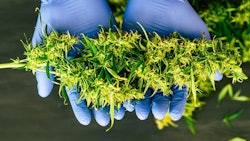
“The last year has seen a significant uptick in hemp-related litigation in nearly all phases of the industry,” from contract disputes to federal action against cannabidiol (CBD) health claims, Jesse Mondry, an attorney with international law firm Harris Bricken, tells Hemp Grower. Lawsuits involving hemp businesses have surfaced throughout the U.S. with hundreds of thousands to an excess of $1 billion at stake.
But a recent lawsuit moving through courts over destruction of hemp has left some growers wondering whether they will face the same fate.
“The allegations in the complaint, if true, are disturbing for growers since it implies that law enforcement may sweep in at any time and confiscate and destroy a crop,” Mondry says. “I hesitate to say much about the merits until the defendants respond to the lawsuit and the facts develop.”
Oregonized Hemp Co. (OHC), an Oregon domestic limited liability company, and its sole member Justin Pitts filed Oregonized Hemp Co LLC v. Josephine County, Oregon, et al, May 1. At issue: approximately 5,000 pounds of what OHC and Pitts claim was industrial hemp that officials in Josephine and Jackson counties seized and destroyed. The suit cites a loss of “not less than $2,000,000 or an amount to be proven at trial.”
OHC had stored its hemp at the “Panther Greenhouse,” as it’s called in the suit, at 1100 Panther Gulch Road in Josephine County. Pitt had moved the company’s hemp there for storage after the fire marshal in Grants Pass, Ore., where OHC is based, told Pitts that “OHC/Pitts could not store ‘fibrous material’ in his building in Grants Pass, and that OHC/Pitts would have to move OHC/Pitts’ industrial hemp to a different off-site location. OHC/Pitts was given thirty (30) days to move the industrial hemp,” according to the lawsuit.
Pitts stored varying amounts of hemp at the Panther Greenhouse from November 2019 through April 22, 2020, the day law officials from Josephine and Jackson counties served a search warrant at the greenhouse and confiscated the hemp stored there.
According to the lawsuit, the warrant authorized seizure of processed marijuana, marijuana plants, marijuana concentrate oils and “any items related to the illegal possession, manufacture or delivery of marijuana.” It did not, however, authorize the seizure of industrial hemp, the suit claims.
Ross Day, the attorney representing OHC and Pitts, tells Hemp Grower: “In Oregon, the law is very clear. You only get to seize what's on that warrant. And if you seize something that's not on that warrant, … you made a big mistake. … It doesn't matter if you thought it was marijuana, but it turns out it's hemp. … It could be two cars, and one could be a ’77 Corvette and one could be a ’78 Corvette, and you take the ’78 when you're only allowed to take the ’77. It doesn't matter that you've got it confused—you were wrong. And I suspect that's why we haven't heard from anybody from law enforcement down there about it because I think they realized they made a big mistake.”
When contacted by Hemp Grower, Travis Snyder, the undersheriff at Josephine County Sheriff’s Office, said, “We do not have a comment in regards to this matter.”
Day says law enforcement presented the search warrant to an employee of OHC on site on April 22, but Day notes, “We're trying to get an actual copy of not only of the warrant but of the affidavit that established probable cause that led to the warrant. That's what we want, and we haven't been able to get either.”
Day also says employees on site at the Panther Greenhouse told law enforcement officials that the plants were industrial hemp, not marijuana.
The next day (“on or about,” per the suit), officials from Josephine and Jackson counties filed a “Supplemental Order to Search Warrant” with the Josephine County Circuit Court for the state of Oregon for permission to destroy the cannabis they had seized.
According to Day, law officials “had taken a representative sample, and so they were asking for permission to destroy the rest.”
The suit also says the defendants violated the 14th Constitutional amendment, which addresses “equal protection of the laws,” citing “the pattern of practice of unequal treatment against Justin Pitts.”
“My client owned a number of properties in Southern Oregon and in Josephine County in particular, … and Oregon has some of the most arcane land-use laws in the country,” Day says. “And my client has had a number of run-ins with Josephine County over his property, and they've been very contentious. … It's just part of a pattern and practice of them just harassing my client. Now, my client can be argumentative and bullheaded at times …, but it has been a very antagonistic relationship … and it's gone on for, we're going on three years now.”
A Rise in Litigation
Mondry says hemp-related litigation is on the rise, and reasons for the uptick are varied. “The collapse in hemp prices last fall caused a lot of disappointment and disruption for growers, investors and others in the hemp supply chain,” he says. “In many cases, those disappointments led to litigation that is still winding its way through the courts. These included partnership disputes and disputes between growers and investors, harvesters, and processors, on up the supply chain to consumer class-action lawsuits against companies selling hemp-derived CBD products.”
One high-profile example is the recent class-action lawsuit against Kentucky-based Bluegrass Bioextracts after the company allegedly breached hundreds of thousands of dollars’ worth of contracts with hundreds of farmers, as Hemp Grower reported in April.
Other lawsuits, however, have been centered on the confusion between hemp, with designated legal tetrahydrocannabinol (THC) limits of 0.3%, and its high-THC sister, marijuana, as is potentially the case with the Oregonized lawsuit.
Apothio LLC, a vertically integrated hemp business, recently filed a suit against Kern County, Calif., and other individuals and government agencies for allegedly destroying a 500-acre hemp crop, Hemp Grower also reported in April.
In another well-known case that was filed in early 2019 and is still moving through the courts, Big Sky Scientific filed a suit (Big Sky Scientific LLC, v. Idaho State Police, et al.) against Idaho State Police and related parties after police seized a truck with 7,000 pounds of what Big Sky says was hemp. In fact, “The driver was carrying paperwork that showed that the product was hemp and not marijuana, and that it tested at or below 0.3% THC,” reported the Denver Law Review. At issue for Idaho officials was that Idaho law prohibits hemp possession unless it contains 0% THC. (Idaho has since amended its laws to allow for interstate hemp transport.) The case’s significance drew the support of the American Trade Association of Cannabis and Hemp, a nonprofit organization of U.S. hemp and marijuana industry leaders, and the U.S. Hemp Roundtable, a hemp education and advocacy organization, which filed amicus briefs in support of Big Sky Scientific.
Mondry notes that while lawsuits around hemp are on the rise, the case with OHC uncommon. “Although the facts alleged in Oregonized Hemp are concerning, it is important to recognize that this seems to be an outlier case,” he said. “By that I mean that courts are not awash with lawsuits alleging the seizure and destruction of hemp by law enforcement, and the vast majority of hemp appears to be grown and harvested without incident or interference by law enforcement.”


























